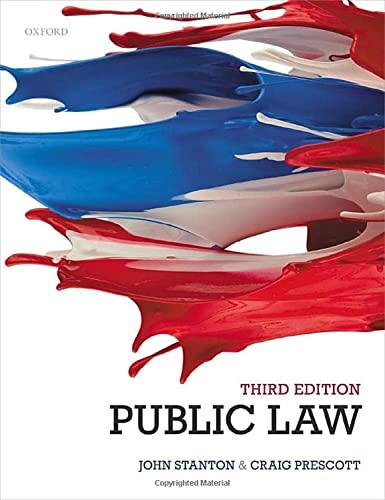Question
Accessory Overhaul Group, Inc. (AOG) provides commercial aircraft component testing, overhauling and certification services. AOG had submitted a bid to Mesa Air Group, Inc. (Mesa),
Accessory Overhaul Group, Inc. (AOG) provides commercial aircraft component testing, overhauling and certification services. AOG had submitted a bid to Mesa Air Group, Inc. ("Mesa"), and its subsidiary, Mesa Airlines, Inc., for work on its planes, which Mesa accepted in the fall of 2007.
AOG began performing work for Mesa in October 2007, and the next month the parties executed a memorandum of understanding (MOU). The MOU provides that it "shall remain in effect until the execution of the Contract by the Parties or its termination as described herein." From 2007 to 2012, AOG serviced and maintained Mesa's wheels, tires and brakes.
In January 2010, Mesa filed for bankruptcy protection, and the bankruptcy court deemed AOG a "critical vendor." Mesa continued its commercial relationship with AOG, and on January 14, 2010, the parties executed a critical trade agreement (CTA). The CTA broadly defined the parties' relationship during Mesa's bankruptcy case.
Sometime in 2011, after Mesa had emerged from bankruptcy, the parties resumed negotiations of a more detailed contract. AOG's president, Ron Byrd, worked with Scott Johnson, Mesa's senior director for maintenance and engineering technical administration, to draft the contract.
Byrd and Johnson exchanged several drafts of an agreement. On November 21, 2011, Johnson sent Byrd an email, stating that he had updated the pricing per AOG's request and that he had included with his email "a soft-copy version as well as the PDF." Johnson then stated, "If you're good, please sign and return. Then, I'll route through our contract signature process here at Mesa." Byrd signed and returned the document that day.
On January 3, 2012, Johnson informed Byrd that the document had "hit a snag" in the finance department. Mesa's senior vice president of finance had "rejected" a term dealing with late fees, and Byrd agreed to the removal of that term.
In March 2012, Johnson presented the November 21st document to Mesa's president, Michael Lotz, for his review. Lotz refused to sign the contract.
On May 9, 2012, AOG met with Mesa to discuss a rate increase. AOG unequivocally told Mesa during the meeting that if the rate did not inrease, it would cease work with Mesa right away or "pretty quickly." Mesa responded that it was going to put the wheel, tire, and brake work back out for bid immediately.
That same day, Mesa issued a new request for proposals on the wheel, tire, and brake maintenance work. AOG bid on the work at its increased rate. By the end of June, Mesa had chosen a different vendor, and on June 30th Mesa removed Mesa's aircraft from AOG's servicing in August.
AOG sent Mesa invoices seeking over $3.4 million. Mesa refused to pay the invoices on the basis that the November 21st document is not a binding contract.
AOG filed suit and Mesa filed a motion for summary judgment on AOG's claims.
Is the contract governed by common law or the UCC?
Step by Step Solution
There are 3 Steps involved in it
Step: 1

Get Instant Access to Expert-Tailored Solutions
See step-by-step solutions with expert insights and AI powered tools for academic success
Step: 2

Step: 3

Ace Your Homework with AI
Get the answers you need in no time with our AI-driven, step-by-step assistance
Get Started


